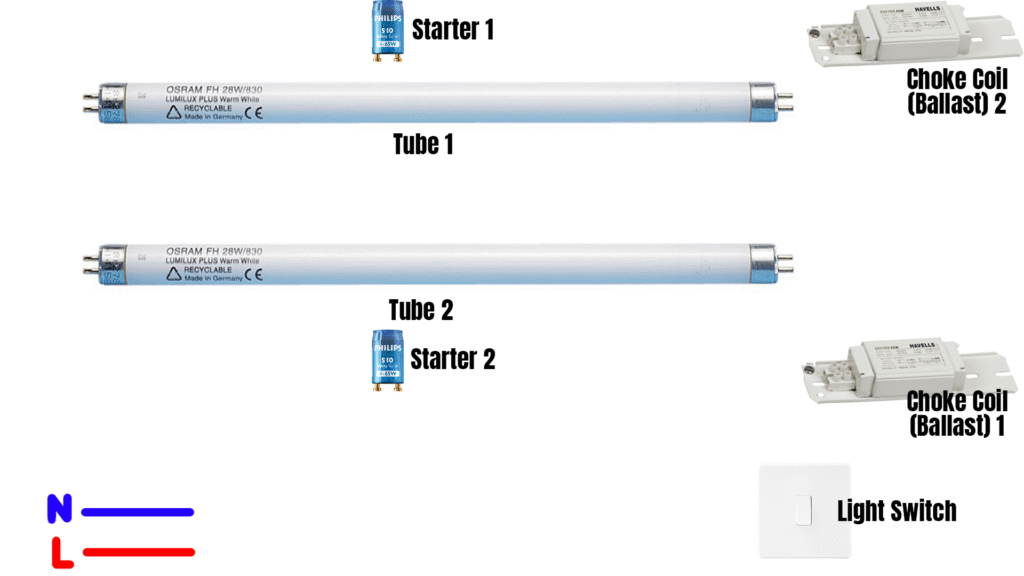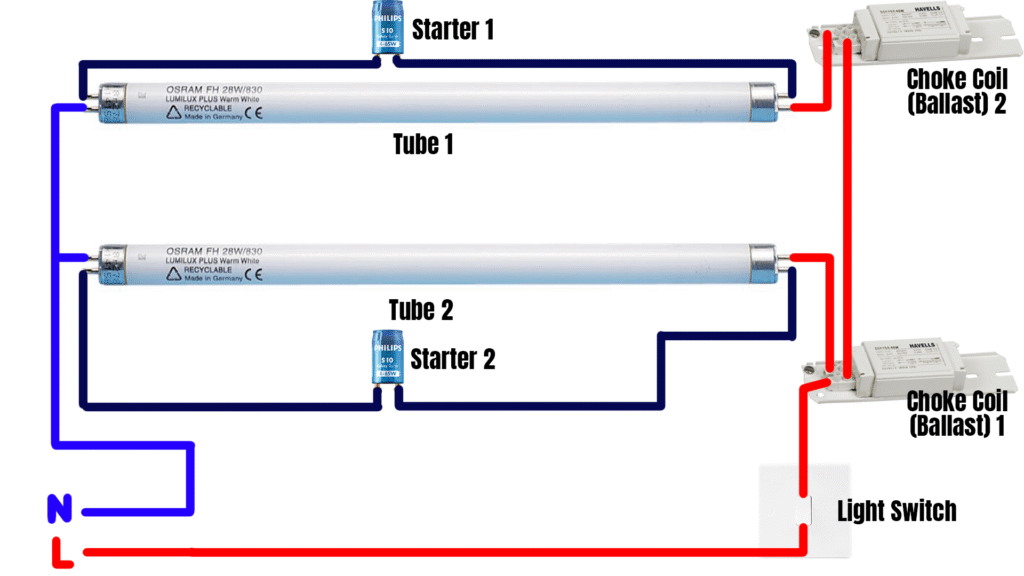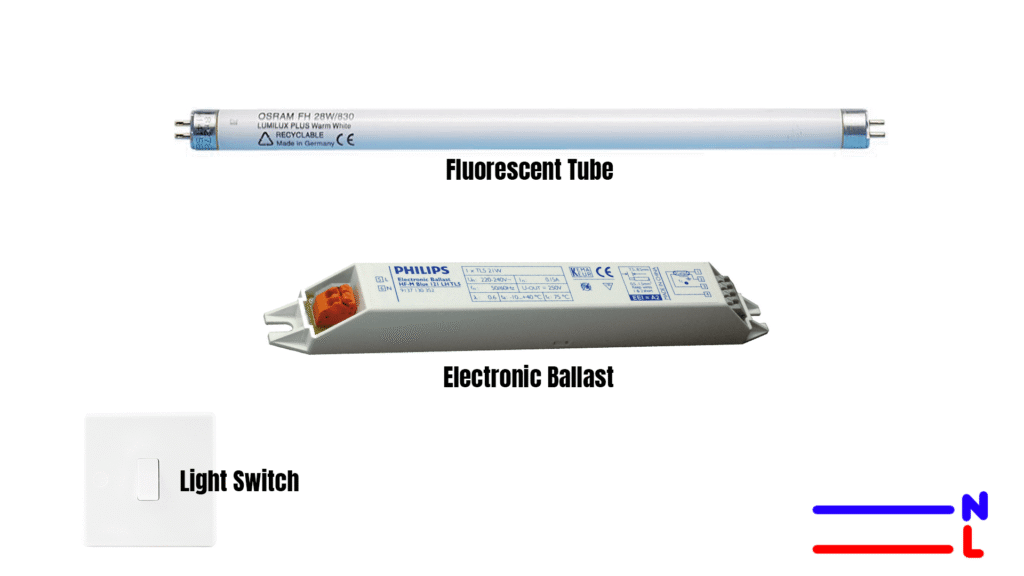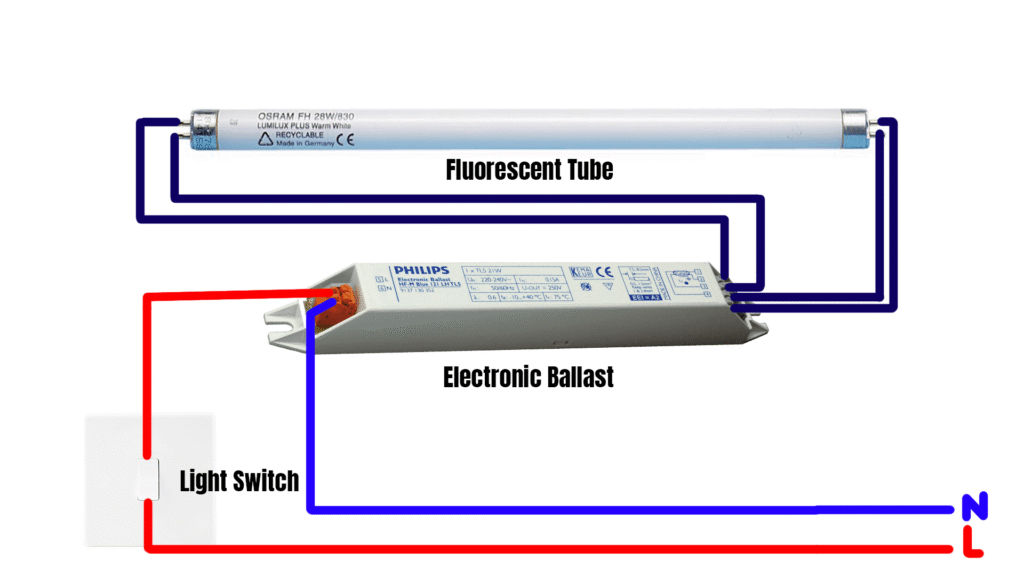In this blog we will hit everything about fluorescent lamps wiring, starting from the components that we use to connect fluorescent tube lamps till the full connection of one fluorescent tube lamp.
After that we will start learning how to wire two parallel fluorescent tube lamps then how to use electronic ballast to illuminate fluorescent tube lamps
What You Will Learn
In this blog, you’ll learn:
- How to wire one fluorescent tube lamp
- How to wire two parallel fluorescent tube lamps
- How to use an electronic ballast to illuminate a fluorescent tube lamp
You can also watch the complete video tutorial on Electrical Engineering Planet YouTube channel.
1-Wiring One Fluorescent Tube Lamp
To wire a single fluorescent tube lamp, you’ll need the following components:
- Fluorescent tube lamp
- Starter
- Choke coil (also known as a magnetic ballast)
- Light switch

Step-by-step Wiring Guide
- Connect the line power source (L) to one terminal of the light switch.
- Connect the other terminal of the switch to one terminal of the choke coil.
- Connect the other terminal of the choke to the first terminal of the lamp.
- Connect the adjacent terminal of the lamp to the first terminal of the starter.
- Connect the second terminal of the starter to the third pin of the lamp (on the opposite side).
- Connect the fourth pin of the lamp to the neutral line (N).
This circuit ensures that the starter initially preheats the lamp filaments. Once the starter opens, the choke creates a voltage spike to ignite the lamp.

2-Wiring Two Parallel Fluorescent Tube Lamps
If you need to install two fluorescent lamps, you can wire them in parallel using two sets of components:
- 2 fluorescent tube lamps
- 2 starters
- 2 choke coils
- 1 light switch

Parallel Wiring Steps
- Connect the line power source (L) to one terminal of the light switch.
- From the other terminal of the switch, branch out two wires:
- One to the first choke coil
- Another to the second choke coil
- Each choke is connected to the first terminal of its respective lamp.
- Each lamp connects to its own starter in the same way described in the single lamp wiring section.
- Finally, connect the last terminal of both lamps together and connect them to the neutral line (N).
This parallel wiring ensures that each lamp operates independently, so if one fails, the other continues to work.

3-Using an Electronic Ballast
Electronic ballasts are modern replacements for traditional chokes and starters. They offer faster ignition, reduced flicker, and improved energy efficiency.

Wiring a Fluorescent Lamp with an Electronic Ballast steps
To wire a lamp with an electronic ballast:
- Connect the line (L) to the input terminal of the electronic ballast.
- Connect the neutral (N) to the other input terminal of the ballast.
- Connect the output terminals of the ballast to the two ends of the fluorescent tube (usually two wires to each end).
No starter is needed in this configuration. Always refer to the diagram printed on the ballast for accurate wiring.

Final Tip
Before doing any wiring, always switch off the power and use insulated tools. Follow safety standards and local electrical codes.
Subscribe to Electrical Engineering Planet YouTube Community to get fresh and trending electrical topics delivered straight to your inbox
Pingback: Complete Guide to Wiring High Pressure Sodium (HPS) Lamps